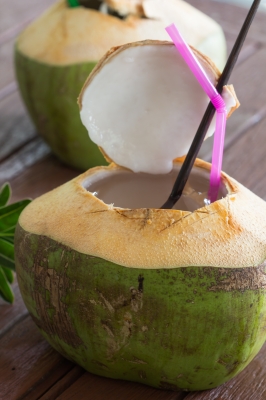Is Coconut Water a Sports Drink?
Written by Dr. L. Lee Coyne
 The coconut water industry and its enthusiasts have been waging a campaign of marketing jargon designed to promote coconut water as the new sport drink. I have often posted and commented on this topic in a negative way. If you understand the science of sport drinks you know that coconut water does not qualify as a sport drink.
The coconut water industry and its enthusiasts have been waging a campaign of marketing jargon designed to promote coconut water as the new sport drink. I have often posted and commented on this topic in a negative way. If you understand the science of sport drinks you know that coconut water does not qualify as a sport drink.
This blog was prompted by an ad on a post by our "national" running store which promoted Zico Coconut Water as a sport drink. This really needs to stop.
First - Coconut water is tasty, refreshing, nutritious beverage and I do really like it. I buy it regularly. However, you need to understand that as a sport drink it falls short in several areas.
Sport drinks are designed to hydrate, replace lost electrolytes and provide carbohydrate energy for endurance performances. Although coconut water is high in potassium, a valuable electrolyte, it is sorrowfully deficient in sodium (potassium = 370 - 460 mg / 250 ml or cup and sodium = 65 - 85 mg /250 ml). Sodium is likely the most significant electrolyte in the hydration process.
When it comes to providing energy, a good sport drink provides 90 - 110 calories of carbohydrate energy in each 250 ml cup. Coconut water provides on average a mere 50 calories per cup (Gatorade is around 60 calories/cup).
Then there is the issue of osmolality - it makes or breaks a sport drink. With coconut water, you never know what the osmolality is because the pure water changes depending on the age of the coconuts (2 - 9 months). That is also another issue - is the water you are buying pure or reconstituted?
I review these matters in detail in two of my previous blogs Sports Drinks Review and Sports Drink Science
Second - I have some concerns over the Zico product advertised. They advertise 3 sizes of water plus 4 flavored versions. There are serious inconsistencies in their labeling. For example, the servings size for the 11.2 oz. (330mL) and the 14 oz (414mL) suggest that each is one serving and they are both listed as 70 calories. In the one liter size, a serving is 8 oz or 250 ml and 50 calories. We also find that the 14 oz is from "reconstituted" coconut water.
Among the flavored versions you find added sugars, added fat, added carrageenan, and coconut cream, depending on the version. All of these added items will affect the osmolality. Then there are inconsistencies between the Canadian and the U.S label. Apparently the product changes when it crosses the border.
When I hear of athletes having stomach upsets or distress during endurance events I know it is because their choice of beverage and energy boost is not hypotonic -- meaning the product is not moving from gut to blood as it should. Read more about this in the further reading section below.
So please -- enjoy your coconut water but do not treat it as a sport drink.